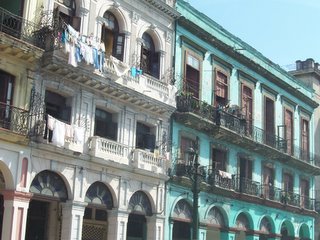¡Soy Cuba!

Most people look at a vacation as a way to get away from everything, to get involved in activities that ordinarily they would find absurd or merely silly, to forget about their surroundings and the native people and indulge in excesses which ordinarily they might avoid. I’m not one of those people. I’d like to learn about the foreign cultures and people and my trip to Cuba with all the provocative and negative news that we hear about this land was of this sort.
Due to the fact that the vacation ‘packages’ in Havana are very rare or expensive, we had to settle for an “all inclusive” package in a vacation resort in Varadero, which is about one and half hour’s drive from Havana. These vacation resorts are islands of plenty in a land of shortages. Many people decide to spend their entire time in these resort areas, and most likely the only natives that they might come in contact with are the people who work in these resorts. The tour organizers and the hotels provide them with all kinds of activities to keep them busy and satisfied.
In our short stay in Cuba, we made three trips to Havana. The first trip was an organized bus trip which took us to Old Havana. We walked through narrow streets with their rich colonial history. Old Havana is flooded with tourists, which makes them a good target for Cubans selling their ‘stuff,’ which is mainly cigars obtained illegally from cigar factories. We were warned by the tour organizers about these people and came in contact with a lot of them. The only one in our group who could speak Spanish was the tour guide and she was the one who was trying to protect us against hordes of people who seemed to have nothing else to do but to walk or sit around the downtown core and target the tourists for one or two pesos.
We visited several sights within Old Havana and our excursion took us to an ancient and historical cemetery where Cubans bury many of their dead. While we were traveling in a nice air-conditioned bus, the only mode of public transportation available to the general public was what is referred to as “camel-buses.” These buses are a very basic mode of transportation and they are always filled to capacity.
After this one day trip to Havana, we felt there must be more to this great city. Our travel book talked about many other landmarks and sights that were not covered in this short trip. We decided to rent a car and do an excursion on our own. On the way to Havana, we witnessed hundreds of people who hitch-hiked to work or other destinations. We were told this phenomenon has created a problem for the government and has forced them to form a hitch-hiking police force! It seemed to me that a good portion of Cuban citizenry spends most of its day trying to find a ride to wherever they’re going.
Driving in Havana was not what I had expected. Even though many street signs are missing, and most cars are in dire need of repair, it seemed most drivers followed the rules. In fact I had an easier time driving in Havana than in Toronto! We visited some museums and had a nice drive in a more upscale area of Havana called La Playa. We walked through narrow and crowded streets of Havana and lunched at local restaurants.
Back at our resort area everything was in perfect order. The guests were sitting in easy chairs, sipping on their drinks and trying to take it easy while the locals were doing their best to make their stay satisfactory. I was told the local people are not allowed in these resort areas.
My short trip to Cuba has altered my mental image of this country. My expectations were not fulfilled and in my mind many questions remain unanswered. I’m aware of the fact that a short stay in a foreign country is hardly sufficient to pass judgment on a people or a form of administration. But I flew to Cuba with high hopes, to see what a socialist country can achieve despite all the trade embargos and all the troubles that the Empire creates for its people.
One thing that I’m sure of is the fact that Cubans are proud people. They’re proud of what they’ve achieved despite all the shortages and despite the constant barrage of negative and fallacious stories that originate from the exiled Cuban community in Florida.
Nevertheless, I expected more. I did not expect to see so many people living in poverty, so many unfinished projects and so many buildings in dire need of repair and reconstruction. Next time around I will stay away from the resorts and try to get to know the people better. I can't wait until the next trip …
 Liberty News-Report on Impeachment
Liberty News-Report on Impeachment
 Pink- Dear Mr. President
Pink- Dear Mr. President
 A few of the Iraqi "insurgents" the US Marines murdered
A few of the Iraqi "insurgents" the US Marines murdered
 Lies and the Lying Liars
Lies and the Lying Liars

 Dancing all night with military dictators
Dancing all night with military dictators
 You are a Donkey, Mr. Danger!
You are a Donkey, Mr. Danger!
 'President' Al Gore
'President' Al Gore
 Ahmadinejad's Letter To Bush
Ahmadinejad's Letter To Bush





6 Comments:
To Anonymous: The usual pro-capitalist attitude refuses to look at history. It is capitalism that has deprived the world's poor people of the opportunity for economic development, not your imaginary "totalitarian" policies of governments like that of Cuba. Take a look at Haiti, right next door to Cuba. Haiti has never had "Communist/Socialist/Totalitarian" leaders. The result? Today, Haiti has almost literally nothing at all. Haiti's people literally live in the open air, and its unemployment rate is close to 100%. The reason? The reason is not that Haiti has not enjoyed the supposed “benefits” of capitalism. Rather, the reason for Haiti’s desperate situation is that it has not enjoyed the kind of leadership that would put a halt to capitalist plunder. Capitalist plunder is the historical reason why these countries were so poor to begin with.
The withdrawal of Soviet assistance, in combination with the effects of the US blockade, created a crisis in Cuba in the early 1990s, leading to massive internal migrations within Cuba, from the eastern part of the island to the vicinity of Havana. In other words, the internal migrations happened at the worst possible time, that is, at the very moment when the country was not able to accommodate them. That is the main reason for the visible poverty seen especially in the western part of the island today. However, everyone in Cuba gets fed, everyone is housed, and everyone has access to basic healthcare services, which can’t be said about the United States. Cuba’s infant mortality rate (6.33 per 1000 live births) is lower than that of the United States (6.50) and Israel (7.03).
And if you think the economic blockade of a poor little country by the largest economic and military power in the world has no effects, you have another think coming. It is not just that the US does not trade with Cuba. The US also bullies other countries into reducing their economic relations with Cuba. And I won’t get into the massive direct sabotage of Cuba’s infrastructure and resources that has been carried out by the US government. After all, this is just a blog comment!
It is colonialism that has deprived the world's poor, not capitalism. I'm amazed at how many people equate these two concepts. It was slavery -- colonialist plunder -- that pushed these countries into poverty.
Cuba's need of Soviet assistance should have been recognized as a bad sign for the economy from the start. "Soviet assistance" is a euphamism for welfare.
I didn't say America's embargo has no effect on the Cuban economy. The Cubans would be better off trading with everybody. Restricting free trade, or managing the economy, (pay attn Socialists!) always brings about a loss of wealth. This is a fundamental concept of capitalism.
The question I pose is: Which is more harmful, America's embargo or Castro's policies?
Cuba has a housing shortage.
The infant mortality rate is because of an unusual situation in American medical care -- how doctors treat infants with very low birth weights. In America, an infant who weighs as little as 400 grams, and not breathing when born, will be placed in an incubator where a doctor will fight for his (or her) life. Infants born this way have over a 50% mortality rate. Those that die are included in America's statistics, but this is not the case in Cuba (as well as some other countries). This is because Cuba only records live births of over 1000g. Anything below that is simply not included in the statistics. So naturally America has a "higher" infant mortality rate.
If you don't believe this, please do some research. I never take statistics out of hand. I always try to investigate any claims in an argument, if possible. Just because one statistic is better than the other doesn't mean they were collected in the same manner. Of course, there is always the question of whether the numbers were accurate or not. Castro wouldn't be the first person to lie....
To Anonymous: This will be my last comment here, unless you choose to identify yourself through a link to your blog or in some other way. Your argument that the treatment of low birth weight babies in the US distorts the statistics is a red herring. Babies of low birth weight constitute only 7 percent of all births in both the US and Cuba. So, even granting your argument, the "actual" infant mortality rate in Cuba would be about 6.8 percent. That is still better than Poland, Slovakia, Estonia, Hungary, Latvia, Ukraine, the former Yugoslavia, Russia, Bulgaria, China, Romania, and over 160 other countries. You may have noticed that I only listed the countries that have been "liberated" from the "yoke" of communism, with disastrous results for the standards of public health, among many other things. Cuba's performance at 6.8 percent, by the way, is still better than that of Israel.
I agree with Al with his assessment of the Cuban situation. It’s hard to be under the yoke of the Empire for so many years and actually make progress too. No doubt the people of Cuba have gained a lot from their revolution. But I knew this even before my trip. I already mentioned in this entry that one week of stay in a foreign land does not give one a clear picture of the whole situation, considering the fact that I could not speak the local language and we were “advised” not to talk politics with the locals. Having said that, I encountered many disturbing images in Cuba. If a foreign trip is supposed to give one a better perspective on a foreign land, this trip only added to my sense of bewilderment.
I achieved a lifelong ambition by visiting Cuba last year.
Castro's regime, and the consequent US embargo, have ironically, kept the country in a time warp. And it is mainly this that attracts foreign tourists to Havana. It is the lack of resources that have saved most of the magnificent buildings from being pulled down, and concrete monstrosities erected in their place. The UN have recognised this and awarded Havana world heritage status.
The country is very poor and they do rely heavily on the tourist dollar. My own perception is that this is now sowing some seeds of discontent, amongst the young, who now see guys like me spending the equivalent of their year’s salary, whilst on holiday for 2 weeks.
Also Cuba had/has an extremely good educational system that turned out more doctors, teachers, and nurses per head of population, than any western democracy. This also is being undermined as professionals leave their chosen field; to work in the tourist resorts, where they can triple their wages,
My feeling is that the country is at a crossroads, and that when Fidel finally departs this planet, the Cubans will move more towards the west. They will have plenty of suitors willing to assist, mainly Canada and Spain, who both appear to have a presence there at the moment.
During my time there, the one thing that struck me was how friendly and open the people were.
They deserve the best, I hope they achieve it.
Your description of Cuba reminds me of my trip to East Germany (Leipzig) before the wall came down. Many of the old buildings looked depressing, but they seemed to have the basics provided for. On the train trip back to the west, I talked to an elderly woman, who owned a nursery (flowers). Her husband liked to hunt, but was not permitted a gun. They had plenty of food, but had to bribe the salesman who called on them for fertilizer for their roses. Some of our salesmen in the west may envy that.
Wolfgang
http://thewararoundus.blogspot.com/
Post a Comment
<< Home